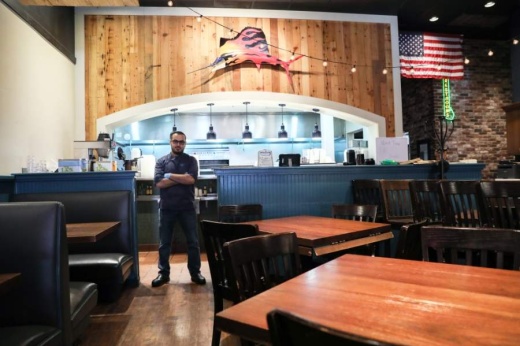Half Shells has served as the neighborhood seafood joint at The Shops at Legacy for nearly 20 years. Co-founder Bill Bayne said he is determined to keep that role.
“You got to put your money where your mouth is if you’re going to claim to be a part of the neighborhood,” Bayne said. “We’re still living our commitment to be a good neighbor.”
Given the restrictions due to the coronavirus, the restaurant has adjusted its menu to offer only to-go-friendly foods. It cut back on staff and changed packaging for easy transport. Still, the restaurant is pulling in only about a third of its typical revenue, Bayne said.
“What the crisis has done ... is forced us to really, completely change our business model,” Bayne said. “If the stakes weren’t so high, this would be a really exciting and challenging business problem to solve.”
The survival of small businesses is essential to the nation’s ability to regain its footing once this crisis is over, said Paul Nichols, executive director of the Institute for Innovation and Entrepreneurship at The University of Texas at Dallas.
“They can throttle up a lot quicker,” he said. “The problem, though, is that they also don’t have the resources of a juggernaut, so they tend to throttle down a lot faster, too.”
City of Plano officials said they will do what they can to help.
“Small businesses are the backbone of our community,” Mayor Harry LaRosiliere said during the city’s first Town Hall for kids.
Jason Graman, managing partner and creator of Plano’s Fork and Fire restaurant, said an abrupt shift to 100% takeout is not sustainable. Restaurants should either be closed or allowed to stay open entirely, he said.
“At some point in time, it’s just not viable or realistic that we can go, you know, 60 days or 90 days doing this,” he said.
The strain on small businesses brought on by the coronavirus is threefold, said Marta Gomez Frey, director of the Collin Small Business Development Center.
Many establishments are not only struggling to get customers through the door but are also grappling with a skeletal workforce and inventory shortages, Frey said.
“The overall mood among business owners is sadness, desperation and frustration,” she said.
Companies of all sizes have been forced to reinvent themselves in the wake of the crisis and have pivoted to provide essential services.
“Good entrepreneurs are always able to take advantage of a shifting market or environment and make sure they stay just in front of customer needs,” Nichols said.
Scotty P’s owner Scott Pontikes said his restaurant is now offering curbside pickup, expanding the third-party delivery services and innovating family-pack meals.
“It is just a constant [effort], moment to moment, minute to minute, trying to figure out, ‘How do we help keep our people working? How do we safely prepare and get food to you?’” Pontikes said. “Our concern as a family business is keeping the doors open for the long term.”
That is also the goal for Jorg Fercher of Jorg’s Café Vienna. “Every day, it is different,” he said.
Fercher’s 19-plus-year-old restaurant is a staple of downtown Plano. Offering only to-go orders has been difficult in more ways than one, he said.
A key part of his Austrian restaurant, he said, is the atmosphere, where guests come to talk and enjoy a meal. Many of his guests have become regulars, and regulars have become friends.
“It’s very hard right now to not see any of them and having an empty restaurant,” Fercher said. “You put your heart and soul and your life savings ... in a business, and you have it for two decades, and then, all of a sudden, it stops. But we roll up positive, and we’re going to find a way, somehow, to go back where we stopped.”
With unemployment claims 32 times higher than they were at this time last year, according to April’s Federal Reserve Economic Data, protecting the local workforce is especially crucial, officials said.
“The pandemic most likely is going to bring on an economic recession,” Plano Budget Director Karen Rhodes-Whitley told City Council members March 30. “We’re already seeing some of this.”
The city is currently expecting at least a 10% drop in sales tax revenue. Half of its hotel tax revenue could be lost, as could millions in property taxes in future years, although this number is a lagging indicator and difficult to project, Rhodes-Whitley said.
Bayne, owner of Half Shells, said orders have shifted in much the same way that they did after the 9/11 attacks. There are more orders these days for fried foods and for crawfish, which are meant to be shared, he said.
“We’re seeing in our sales the desire for people to be comforted and to be able to share meals with close friends and family,” he said.
Pontikes agreed that food is a comfort in hard times, and providing that is something that he plans to continue providing for Plano.
“We will fight until we just can’t fight anymore,” Pontikes said. “There’s just no—I don’t think there’s an option.”




